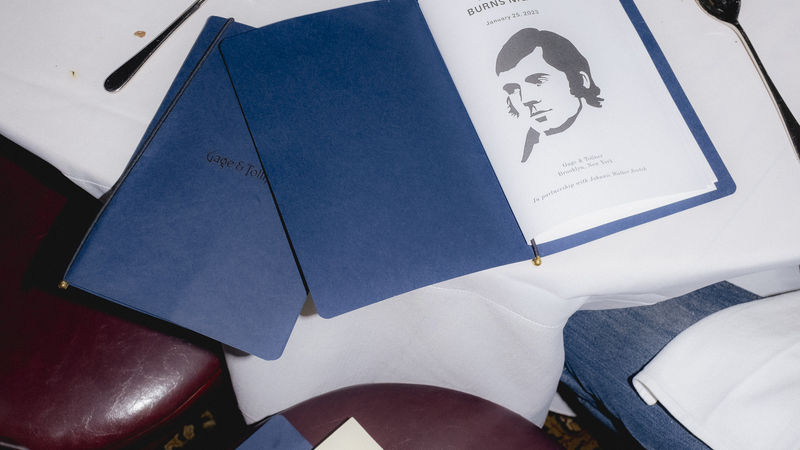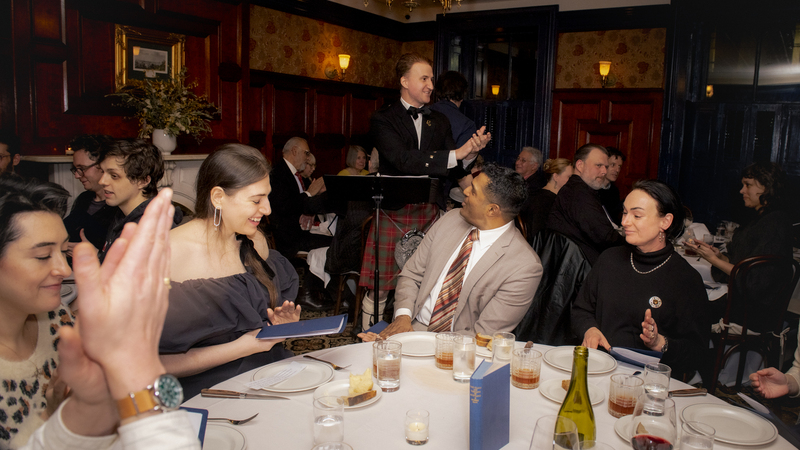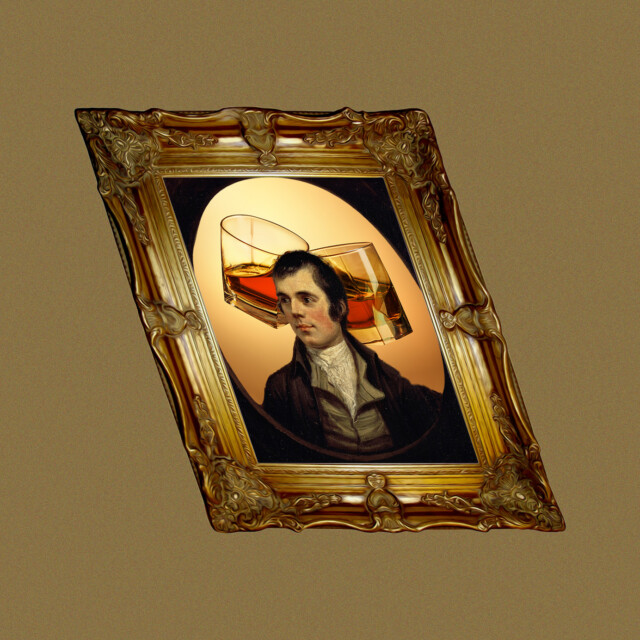It used to be that, once the holiday season was over, a celebratory dry spell commenced, a party-free span that wasn’t broken until the communal bacchanals of the Super Bowl, Mardi Gras, and St. Patrick’s Day.
That is no longer the case. These days, the echoes of “Happy New Year!” have barely faded when the sound of bagpipes fill the air, and our inboxes start to fill up with Burns Night invites from local restaurants and bars.
This year, many of those announcements are coming from first-timers. In Louisville, the Scotch-focused Tartan House is holding its first Burns Night. In Austin, Murray’s Tavern will make its initial foray into the annual holiday. The same is true at Lucky’s, a bar and restaurant in Rochester, N.Y.
The newly adopted addition to the calendar is a godsend to bars, where January is generally a dry month, not only in terms of Dry January participants, but monetary intake.
“Any time you can curate something special to get people’s attention during a slow time is a good thing for sure,” says Jeff Knott, an owner of Tartan House.
St. John Frizell, an owner of Brooklyn’s Gage & Tollner, and Sunken Harbor Club, the bar above it — which will host its third Burns Nights this year — goes Knott one further. “If Burns was born in December, it would be difficult to celebrate him at all,” he says, “because around the holidays our private dining rooms are pretty fully booked.”
This will be the first Burns Night experience for many of the people attending these events. And nearly as many probably don’t even know what a Burns Night is, or who it’s named after.
“We’ll have some literary people, saying, ‘This is cool,’” says Travis Tober, owner of Murray’s Tavern. “More than likely, 75 to 80 percent of the people will have had no idea.”
Burns Night is a celebration of the work and life of Robert Burns, the 18th-century Scottish poet who is best known today as the person who wrote the words to “Auld Lang Syne.” (In this way, everyone in the United States knows one Robert Burns poem, if only unconsciously.) The poet’s second biggest claim to fame on this side of the pond is the Bobby Burns cocktail, a pre-Prohibition mixture of Scotch, vermouth, and Benedictine.
Burns Night and Burns suppers began to be held shortly after the poet’s death. Usually, they take place on Burns’ birthday, Jan. 25. A typical event consists of readings of Burns’ poetry, various toasts, and the “piping in” and cutting of the haggis, the notorious Scottish dish made of sheep offal that is not for the weak of heart. There are often a few people dressed in kilts and a lot of Scotch is drunk.

Until recently, a Burns Night celebration was rather hard to find. A city’s local Scottish society usually staged one, and maybe there was another at a cocktail bar or restaurant particularly dedicated to old drinking traditions and rituals. In the last few years, however, it has become more common.
“I feel like in the last couple years, especially post-Covid, people need to find an excuse to go out and be entertained,” says Tober. “People say we’re in the hospitality business. I say we’re in the entertainment business. People can make cocktails at home. What’s going to get them out of the house?”
Jeff Knott agrees.
“It certainly seems to have grown a ton,” he says. “I don’t really recall seeing many at all until the last few years. I think it’s a mix of things, but I think, in this day and age, people really turn up for a ‘day,’ whether it’s National [insert random drink] day, or an event like Burns Night.”
Frank Caiafa, a career barman, has for the past two years taken part in the Burns Night held at The Players, a private social club on Gramercy Park in Manhattan with a theatrical bent. It was founded by actor Edwin Booth in 1888.
“I think that fans of the event become fans of the poet, in that order,” he quips.
“There are very few opportunities during the year for adults to sit around and read poetry to each other. As a poet, Robert Burns was often addressing particular issues of his day, but many of the themes of his work are universal.”
At Tartan House — the only Scotch bar in a city known for bourbon — it was only natural that the bar host a Burns Night. Chuck Cerankosky, the owner of Lucky’s, also saw a spiritual connection between his restaurant and the holiday.
“We style ourselves as a British pub masquerading as a neighborhood joint,” Cerankosky says. “We pride ourselves on our Sunday roasts. We always get intrigued by opportunities to explore British Isles culture, and any event in which there is an opportunity to investigate cuisine and pair it with cocktails, we’re all for.”
For other bars, however, the fit is not so obvious. But that, too, can be a reason to bring Bobby Burns into the fold.
“There’s so much agave here, so Scotch gets ignored,” says Tober. That situation doesn’t sit well with Tober, who calls Scotch his “favorite spirit of all time.”
Murray’s will offer a special Scottish menu Friday through Sunday, Jan. 24-26. Tober is also bringing in a Scotch brand ambassador from Beam Suntory, and offering 1-ounce pours of Bowmore 12-year-old and Laphroaig at cost.
Frizell’s connection to the holiday goes back to the days when his father and stepmother used to host Burns Night in their house in Metuchen, N.J.

“My uncle Mark, a chef, would prepare the haggis and other foods with my stepmother,” says Frizell. “The guests took this event very seriously, and many of them came in black tie or kilts and had poems or speeches or toasts prepared to read.”
The evenings at Gage & Tollner are steered by Tyler Caffall, a former Fort Defiance bartender, and “an excellent actor and performer,” says Frizell. “He takes his role extremely seriously and works for weeks to put the show together. It’s a really full program that runs throughout the evening, with poems and toasts throughout.”
The evening ends with Frizell himself sitting at the piano, playing “Auld Lang Syne” while the guests gather around and sing every verse.
For Frizell, the appeal of the celebration is simple.
“There are very few opportunities during the year for adults to sit around and read poetry to each other,” he says. “As a poet, Robert Burns was often addressing particular issues of his day, but many of the themes of his work are universal.”
There may be one more reason why Burns Nights have lately increased in number: timing. Aside from the much-needed boon to business mentioned above, Caiafa thinks the ritual has benefited from the chilly nature of Burns’s birth month.
“At the end of the day, I think the time of year helps add to the attraction,” he says. “Nothing beats a wee dram of fine Scottish whisky on a cold, January night. If Robert Burns happened to be born in July, there probably would not be a popular Burns Night.”
